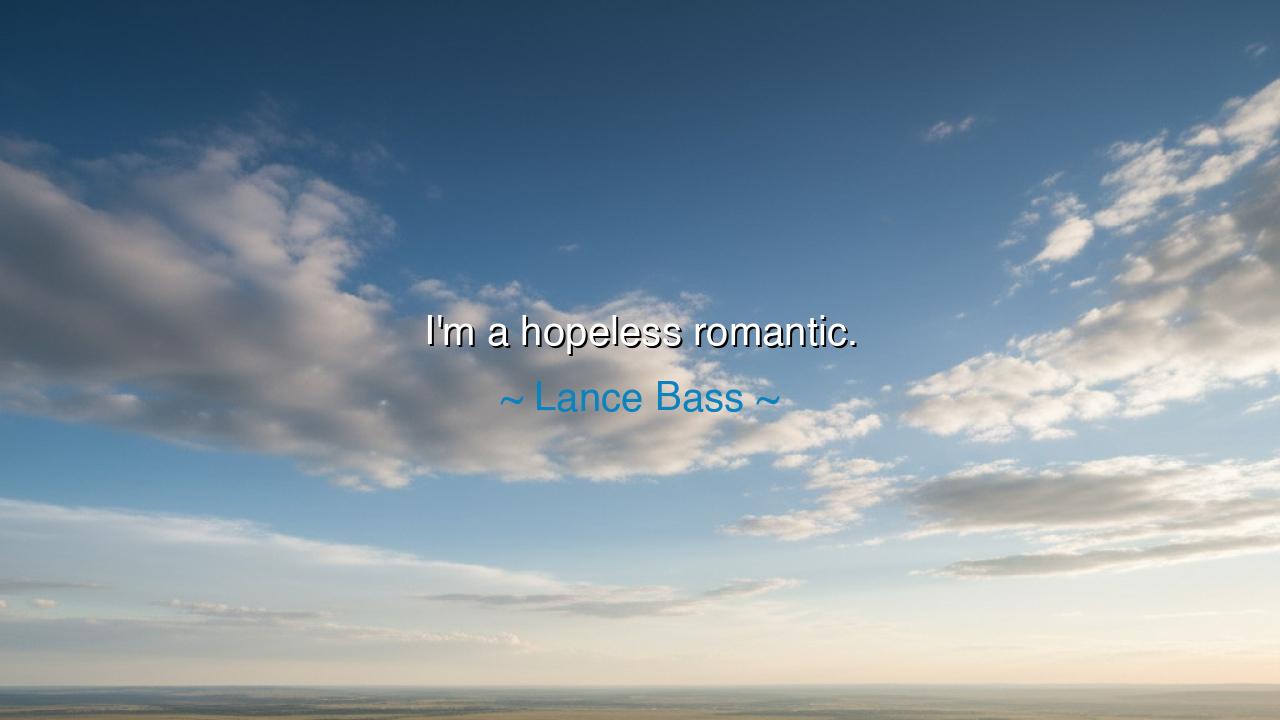
I'm a hopeless romantic.






In the words of Lance Bass, “I’m a hopeless romantic.” This brief declaration, though simple, carries a weight that transcends the age in which it was spoken. To be a hopeless romantic is not to surrender to despair, as the phrase might suggest, but rather to live with a heart so open, so trusting, and so full of longing for beauty and love that it persists despite disappointments, heartbreaks, or the world’s cynicism. It is a confession of faith—not faith in gods or kingdoms, but in the unseen power of love itself.
The ancients knew this condition of spirit well. The poet Sappho wrote of it when she sang of lovers whose presence “makes the heart tremble as the leaves of the trees.” The medieval troubadours embodied it when they wandered through kingdoms, singing of unattainable loves with voices filled with yearning. To be a hopeless romantic has always meant to stand against the forces of coldness and pragmatism, daring to hope where others laugh, daring to believe in forever when the world insists on impermanence. Bass’s confession is thus not weakness—it is courage dressed in tenderness.
Consider the tale of Abelard and Héloïse, two souls bound by passion in the 12th century. Though their love brought them pain, exile, and sorrow, Héloïse declared in her letters that she would never regret their union, for even in suffering, their bond had lifted her spirit higher than a loveless life ever could. They were hopeless romantics, for they chose love even when it promised anguish. And though centuries separate us from them, their story still burns brightly, for the world remembers those who dared to love without calculation.
The beauty of the hopeless romantic lies in their refusal to be hardened. Many who are wounded by life turn bitter, closing their hearts to protect themselves. But the hopeless romantic, though scarred, chooses again and again to open wide the gates of the heart. This openness is both a risk and a gift. It is the risk of heartbreak, but it is also the gift of experiencing life in its most vibrant, passionate form. For what is life without love, laughter, devotion, and the aching sweetness of longing?
Yet to be such a soul is not without trial. The hopeless romantic may be mocked by others who pride themselves on practicality. They may be called naïve or foolish. But the ancients taught that folly in love is a nobler fate than emptiness in caution. For it is better to have loved too deeply and too wildly than to live untouched by passion, never having risked the beauty that gives existence its meaning.
The lesson, then, is this: to be a hopeless romantic is to live with bravery. It is to embrace vulnerability as strength, to believe in gestures of tenderness, in letters written by hand, in devotion that does not end when tested. It is to honor love not as an illusion, but as the highest calling of the human heart. Such souls keep alive the flame that others would let die, and in doing so, they save the world from growing too cold.
And what must you do? Do not be ashamed if your heart yearns for great love, for deep gestures, for beauty that moves the soul. Cherish your romantic nature, and let it guide you to acts of kindness, to bold confessions, to vulnerability unashamed. Love not halfheartedly, but fully. Write the letter, give the flower, speak the truth. For in a world that often hides behind cynicism, to say “I am a hopeless romantic” is to stand as a light in the darkness, a reminder that love, above all else, is still worth believing in.






AAdministratorAdministrator
Welcome, honored guests. Please leave a comment, we will respond soon